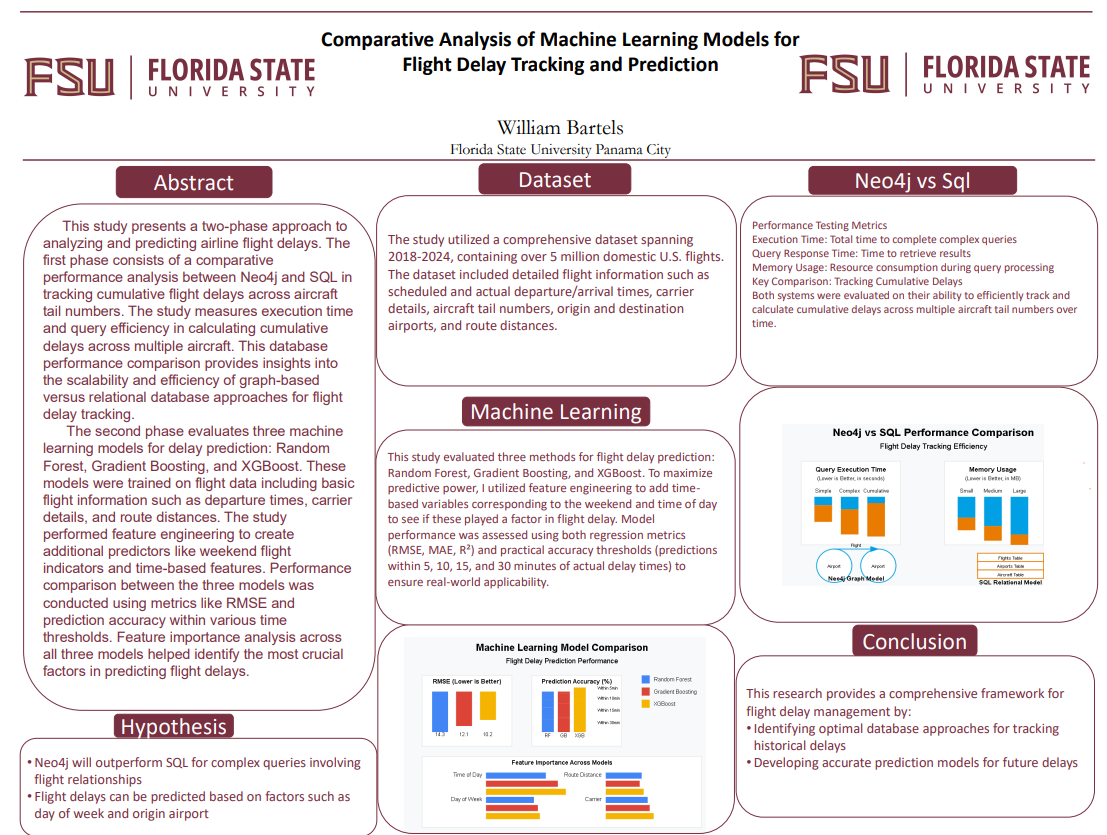Student Research Symposium Program Portal: Submission #117
Submission information
Submission Number: 117
Submission ID: 8156
Submission UUID: 75624e1e-b91b-4038-a300-64120616a462
Submission URI: /student-research/symposium/research-symposium-program-portal
Submission Update: /student-research/symposium/research-symposium-program-portal?token=qwdkb2aK8QkHndZ21uq1r-qFt4Cfd31takYgSUeDbBE
Created: Sat, 02/08/2025 - 10:59 PM
Completed: Sat, 02/08/2025 - 10:59 PM
Changed: Mon, 04/14/2025 - 12:36 PM
Remote IP address: 50.4.43.202
Submitted by: Anonymous
Language: English
Is draft: No
Webform: Research Symposium Program Portal WF
Submitted to: Student Research Symposium Program Portal
William
Bartels
{Empty}

Computer Science
Hi, I am Robbie Bartels, a graduating senior this year in Computer Science.
My research has centered on optimizing database architectures for machine learning applications, working to create more efficient systems for processing and analyzing large datasets. This intersection of structured data management and predictive modeling has become my professional passion, driving me to develop technologies that can scale effectively while maintaining data integrity.
My research has centered on optimizing database architectures for machine learning applications, working to create more efficient systems for processing and analyzing large datasets. This intersection of structured data management and predictive modeling has become my professional passion, driving me to develop technologies that can scale effectively while maintaining data integrity.
Comparative Analysis of Machine Learning Models for Flight Delay Tracking and Prediction
This study presents a two-phase approach to analyzing and predicting airline flight delays. The first phase consists of a comparative performance analysis between Neo4j and SQL in tracking cumulative flight delays across aircraft tail numbers. The study measures execution time and query efficiency in calculating cumulative delays across multiple aircraft. This database performance comparison provides insights into the scalability and efficiency of graph-based versus relational database approaches for flight delay tracking.
The second phase evaluates three machine learning models for delay prediction: Random Forest, Gradient Boosting, and XGBoost. These models were trained on flight data including basic flight information such as departure times, carrier details, and route distances. The study performed feature engineering to create additional predictors like weekend flight indicators and time-based features. Performance comparison between the three models was conducted using metrics like RMSE and prediction accuracy within various time thresholds. Feature importance analysis across all three models helped identify the most crucial factors in predicting flight delays.
The second phase evaluates three machine learning models for delay prediction: Random Forest, Gradient Boosting, and XGBoost. These models were trained on flight data including basic flight information such as departure times, carrier details, and route distances. The study performed feature engineering to create additional predictors like weekend flight indicators and time-based features. Performance comparison between the three models was conducted using metrics like RMSE and prediction accuracy within various time thresholds. Feature importance analysis across all three models helped identify the most crucial factors in predicting flight delays.
Dr. Works
Worcester Polytechnic Institute
Computer Science
keworks@fsu.edu
n/a
n/a
database, machine learning, flight
C -3 R- 6
Complete
Face to Face Poster session

Yes
2025
5th annual Undergraduate Research Symposium, April 17, 2025
https://pc.fsu.edu/student-research/symposium/research-symposium-program-portal?element_parents=elements/student_photo&ajax_form=1&_wrapper_format=drupal_ajax&token=qwdkb2aK8QkHndZ21uq1r-qFt4Cfd31takYgSUeDbBE
{Empty}

